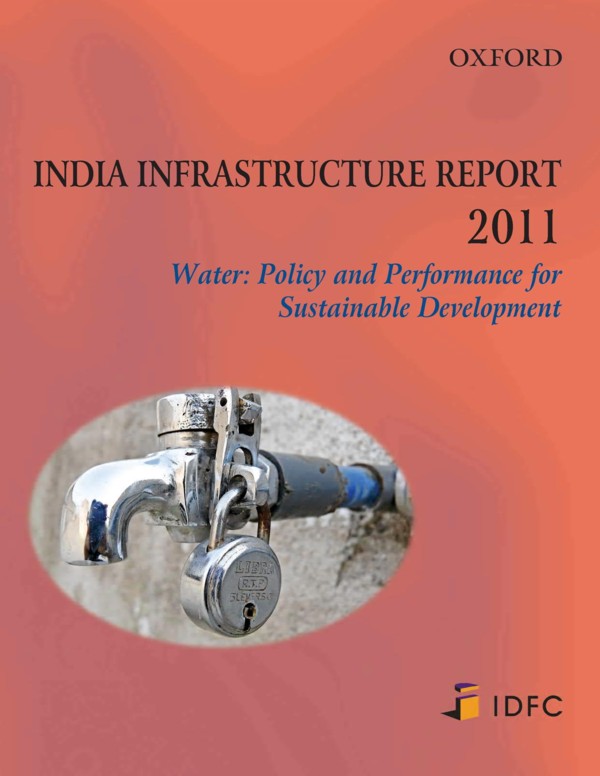The India Infrastructure Report (2011) brought out by the Infrastructure Development Finance Company focuses on 'water' and seeks to 'evolve an appropriate policy framework from the perspective of rights, entitlements, and conflict resolution mechanisms'. The report aims to answer the following questions:
- How clear is the strategic vision for water resource management and sustainable development?
- How effective and equitable is the legal framework?
- Given that only the supply-side approach will not help in meeting future demand, what legal, regulatory, institutional, and pricing mechanisms will be necessary to efficiently manage and restrain demand?
 Authors Piyush Tiwari and Ajay Pandey begin the overview by illustrating the tenuous nature of India's water security in the face of rising demands and climate change. They explain that this insecurity is aggravated by inefficiency in water use and irresponsibility in the management of water resources. Despite this, the government has largely focused on increasing supply with very little attention given either to demand management or operation and maintenance of created infrastructure.
Authors Piyush Tiwari and Ajay Pandey begin the overview by illustrating the tenuous nature of India's water security in the face of rising demands and climate change. They explain that this insecurity is aggravated by inefficiency in water use and irresponsibility in the management of water resources. Despite this, the government has largely focused on increasing supply with very little attention given either to demand management or operation and maintenance of created infrastructure.
The report emphasizes the need to move away from the techno-centric and supply-based strategy used so far, towards one that includes efficient water use, appropriate water valuation, demande management, reduction of pollution and increasing water awareness.
Section I : Macro
1. A river basin perspective of water resources and challenges
Anju Gaur and Priyanie Amerasinghe
2. Implications of climate change for water resources management
P.P. Mujumdar
3. Opportunities for trans-boundary water sharing in the Ganges, the Brahmaputra, and the Meghna basins
Mashfi Us Salehin, M. Shah Alam Khan, Anjal Prakash, And Chanda Gurung Goodrich
4. A million revolts in the making: Understanding water conflicts
Suhas Paranjape and K.J. Joy
5. Water rights and the ‘new’ water laws in India: Emerging issues and concerns in a rights based perspective
Videh Upadhyay
Section II: Rural
6. Past, present, and the future of canal irrigation in India
Tushaar Shah
7. Groundwater irrigation in India: Growth, challenges, and risks
Vasant P. Gandhi and Vaibhav Bhamoriya
8. Rainwater harvesting for irrigation in India: potential, action, and performance
Vasant P. Gandhi and Vaibhav Bhamoriya
9. Water management institutions for enhancing water and food security: Designing for better adaptiveness
Vaibhav Bhamoriya and Vasant P. Gandhi
10. Evolving regulatory framework for rural drinking water: Need for further reforms
Philippe Cullet
11. Changing waterscapes in the periphery: Understanding peri-urban water security in urbanizing India
Anjal Prakash, Sreoshi Singh, and Vishal Narain
Section III: Urban
12. Provincial water access in China and India: A comparative assessment
Fan Mingxuan and Bhanoji Rao
13. Review of reforms in urban water sector: Institutional and financial aspects
Subodh Wagle, Pranjal Deekshit, and Tejas Pol
14. Addressing the challenge of financial sustainability in urban water supply services: Role of performance, monitoring, and planning
Vandana Bhatnagar and S.R. Ramanujam
15. Private sector involvement in water
Part I PPPs in the drinking water and irrigation sectors: A review of issues and options
V. Sathyanarayana and D.T.V. Raghu Rama Swamy
Part II Water sector: A private equity perspective
Prasad Gadkari and Shishir Maheshwari
16. Transforming water utilities: Policy imperatives for India
Piyush Tiwari and Ranesh Nair
17. Water in cities: Rethinking services in transformation
Marie-Hélène Zérah and Sylvy Jaglin
18. Industrial water demand in India: Challenges and implications for water pricing
Suresh Chand Aggarwal and Surender Kumar
Section IV: Wastewater
19. Water pollution in India: an economic appraisal
M.N. Murty and Surender Kumar
20. Municipal wastewater management in India
J.S. Kamyotra and R.M. Bhardwaj
21. The economics of municipal sewage water recycling and reuse in India
Pritika Hingorani
Section V: Water valuation and institution
22. Water sector reforms: implications on empowerment and equity
Sachin Warghade and Subodh Wagle
23. Pricing the ‘fluid mosaic’: Integrated ‘inclusive valuation’ of water from the scarcity value perspective
Nilanjan Ghosh and Sarika Rachuri
24. Pricing urban water: a marginal cost approach
Kala Seetharam Sridhar and Om Prakash Mathur
25. Dams and environmental governance in north-east India
Neeraj Vagholikar
26. Evaluation of national water mission using global water partnership toolbox
Suman Apparusu
Section VI: infrastructure review
27. The infrastructure sector in India 2010–11
Manisha Gulati